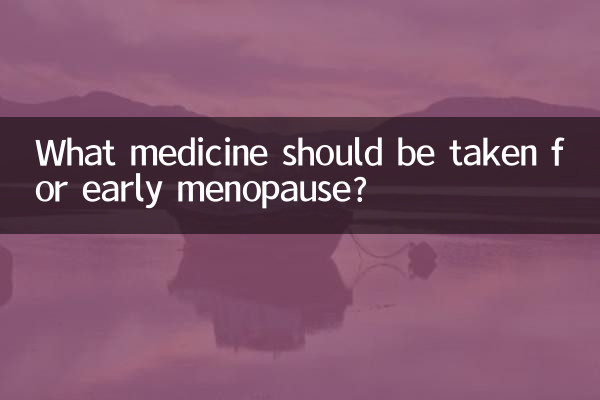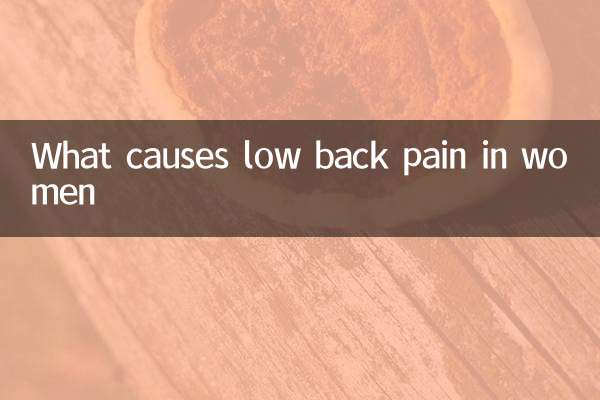What medicine should be taken for early menopause?
In recent years, with the accelerated pace of life and increased pressure, the phenomenon of women entering menopause early has gradually increased. Menopause usually occurs between the ages of 45 and 55, but some women may experience related symptoms before the age of 40. This is called "premature menopause" or "early menopause." This article will combine the hot topics and hot content on the Internet in the past 10 days to give you a detailed introduction to the drugs and precautions that can be taken when entering menopause early.
1. Common symptoms of early menopause

The symptoms of early menopause are similar to those of natural menopause, but may be more severe. Here are some common symptoms:
| Symptom type | Specific performance |
|---|---|
| vasomotor symptoms | Hot flashes, night sweats, palpitations |
| Psycho-emotional symptoms | Anxiety, depression, irritability, insomnia |
| genitourinary symptoms | Vaginal dryness, painful intercourse, frequent urination and urgency |
| Other symptoms | Joint pain, dry skin, memory loss |
2. Commonly used drugs to treat early menopause
For the treatment of early menopause, doctors may prescribe the following drugs based on the patient's specific conditions:
| drug type | Representative medicine | effect | Things to note |
|---|---|---|---|
| Hormone replacement therapy (HRT) | Estrogen preparations, progesterone preparations | Relieve menopausal symptoms and prevent osteoporosis | The risk needs to be assessed by a doctor and is not suitable for all patients. |
| Phytoestrogens | Soy isoflavones, black cohosh extract | Relieve mild menopausal symptoms | The effect is mild and requires long-term use |
| antidepressants | SSRI antidepressants | Improve mood swings and sleep problems | Please follow your doctor's advice, there may be side effects |
| Calcium and Vitamin D | Calcium carbonate, vitamin D3 | Prevent osteoporosis | Blood calcium levels need to be monitored regularly |
| Chinese medicine conditioning | Liuwei Dihuang Pills, Kunbao Pills | Regulate the balance of yin and yang | Need TCM syndrome differentiation and treatment |
3. Analysis of the pros and cons of hormone replacement therapy
Hormone replacement therapy (HRT) is currently the most effective way to treat menopausal symptoms, but it is also controversial:
| advantage | risk |
|---|---|
| Quickly relieve symptoms such as hot flashes and night sweats | May increase breast cancer risk |
| Improve vaginal dryness and quality of sexual life | May increase risk of thrombosis |
| Prevent osteoporosis and fractures | May increase stroke risk |
| Improve skin elasticity and radiance | May cause discomfort such as breast swelling and pain |
4. Suggestions on lifestyle adjustments
In addition to medication, lifestyle adjustments are equally important in relieving menopausal symptoms:
| Adjustment | specific suggestions |
|---|---|
| diet | Increase the intake of soy products, dark vegetables, and nuts; reduce caffeine and alcohol |
| sports | At least 150 minutes of moderate-intensity exercise per week, such as brisk walking and swimming |
| sleep | Maintain a regular sleep schedule and avoid using electronic devices before going to bed |
| stress management | Practice meditation, deep breathing or yoga |
| social events | Stay socially connected and join interest groups |
5. When Do You Need Medical Treatment?
It is recommended to seek medical treatment in time when the following situations occur:
1. Menopausal symptoms appear before the age of 40
2. Symptoms seriously affect daily life and work
3. Abnormal vaginal bleeding occurs
4. Emotional problems continue to worsen
5. Before considering hormone replacement therapy
6. Latest research progress
According to recent hot topics, research on menopause treatment has the following new findings:
1. Personalized hormone therapy may reduce risk
2. The relationship between intestinal flora and menopausal symptoms has attracted attention
3. New selective estrogen receptor modulators are under development
4. Cognitive behavioral therapy has a significant effect on alleviating psychological symptoms of menopause.
In short, early menopause requires comprehensive treatment, including multi-faceted interventions such as medications, lifestyle and psychological support. Be sure to consult a professional doctor before taking medication to develop the most suitable treatment plan based on individual circumstances. At the same time, maintaining a positive and optimistic attitude is equally important to alleviate symptoms.

check the details

check the details